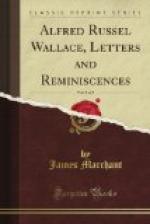Most valuable to me also are your numerous references to Darwin’s letters, so that the article serves as a compendious index to the five volumes, as regards this subject.
Especially admirable is the way in which you have always kept Darwin before us as the centre of the whole discussion, while at the same time fairly stating the sometimes adverse views of those who differ from him on certain points....—Yours very truly,
ALFRED R. WALLACE.
* * * * *
SIR W.T. THISELTON-DYER TO A.R. WALLACE
The Ferns, Witcombe, Gloucester. June 25, 1909.
Dear Dr. Wallace,—It is difficult for me to tell you how gratified I am by your extraordinarily kind letter.... The truth is that success was easy. It has been my immense good fortune to know most of those who played in the drama. The story simply wanted a straightforward amanuensis to tell itself. But it is a real pleasure to me to know that I have met with some measure of success.
There are many essays in the book that you will not like any more than I do. The secret of this lies in the fact, which you pointed out in your memorable speech at the Linnean Celebration, that no one but a naturalist can really understand Darwin.
I did not go to Cambridge—I had my hands full here. I was not sorry for the excuse. There seemed to me a note of insincerity about the whole business. I am short-tempered. I cannot stand being told that the origin of species has still to be discovered, and that specific differences have no “reality” (Bateson’s Essay, p. 89). People are of course at liberty to hold such opinions, but decency might have presented another occasion for ventilating them.—Yours sincerely,
W.T. THISELTON-DYER.
* * * * *
SIR W.T. THISELTON-DYER TO A.R. WALLACE
The Ferns, Witcombe, Gloucester. July 11, 1909.
Dear Mr. Wallace,— ... I have just got F. Darwin’s “Foundations.” He tries to make out that his father could have dispensed with Malthus. But the selection death-rate in a slightly varying large population is the pith of the whole business. The Darwin-Wallace theory is, as you say, “the continuous adjustment of the organic to the inorganic world.” It is what mathematicians call “a moving equilibrium.” In fact, I have always maintained that it is a mathematical conception.
It seemed to me there was a touch of insincerity about the whole celebration,[37] as the younger Cambridge School as a whole do not even begin to understand the theory.... I take it that the reason is, as you pointed out, that none of them are naturalists.—Yours sincerely,
W.T. THISELTON-DYER.
* * * * *




